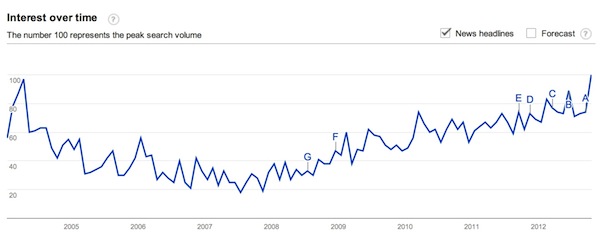“Marketing automation” as the label for a major — if slightly amorphous — category of modern marketing software appears to be here to stay. Three recent points on the curve:
- The acquisition of Pardot by ExactTarget, labeled as a marketing automation deal.
- The IPO of Eloqua earlier this year, again labeled as a marketing automation offering.
- A recent IDC report that includes marketing automation as an explicit budget allocation.
The latter is perhaps the most significant, as having a line item in the marketing budget is the Holy Grail of any marketing technology. When the challenge shifts from trying to convince people that they should buy a marketing automation platform to simply convincing them which one they should adopt, the industry has taken a major leap forward.

It wasn’t always obvious that “marketing automation” would be the label for this category of software that emerged from lead generation and lead nurturing technologies, and came to include a wide array of analytics and social media marketing capabilities.
For a couple of years, a number of the major players in the space worked hard to change the name. Eloqua and Marketo both preferred to position their platforms as “revenue performance management” solutions. HubSpot has stalwartly resisted the term, preferring “inbound marketing,” the category of marketing activities that it christened.
Why the rash against “marketing automation” from some of its very inventors?
For a while, marketing automation was starting to get a bad rap. Frankly, early implementations weren’t always as successful as adopters hoped they might have been. (Remind you of the early days of enterprise resource planning? The early days of CRM? There’s a pattern here.)
The word “automation” also implied a fairly mechanical, impersonal nature to the interactions, at a time when social media mania was rising, emphasizing the power of the human touch.
And, of course, every software provider in the world wants to differentiate their offering and control the message. To the degree that marketing automation was still up-in-the-air as the name for this category, there was plenty incentive to change the label to one that a particular firm could unequivocally own.
But over time, all of these reasons to avoid the term have faded. Marketing automation implementations are increasingly proving their ROI. All of the major analyst houses now refer to marketing automation and its best practices. The label “marketing automation” has outgrown its literal meaning, and indeed has shifted the discussion to how it can provide more personalized experiences.
That’s really not too far of a stretch. After all, Amazon’s amazing “personalization” is actually just an automated algorithm, not remote in-store greeters, madly typing away recommendations every time somebody lands on a page.
But the real reason marketing automation appears to have won is, well, that’s just what everyone calls it. As vendors returned to the term, capturing interest from people who were searching for the term, more vendors followed suit. Here’s the search trend for “marketing automation” on Google for the past 7 years:

After an initial peak of hype, there was a trough of disillusionment, followed by a slow and steady climb of enlightenment. It’s the perfect incarnation of the Gartner Hype Cycle.
Now almost all of the key players in the space have “marketing automation” featured in the title of their web sites: Act-On, Aprimo, Eloqua, Genius.com, Marketo, Pardot. HubSpot still prefers inbound marketing, but they promote their marketing automation capabilities on their home page. Infusionsoft chooses to emphasize its CRM capabilities instead. IBM and Oracle are too large to register on this scale.
There may yet be a nomenclature revolution. Vendors who are trying to position “marketing automation” as a feature rather than the label for their overall platform may yet redefine the language of the market. But the stakes are getting higher.



